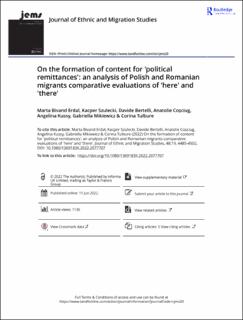| dc.contributor.author | Erdal, Marta Bivand | |
| dc.contributor.author | Szulecki, Kacper | |
| dc.contributor.author | Bertelli, Davide | |
| dc.contributor.author | Coșciug, Anatolie | |
| dc.contributor.author | Kussy, Angelina | |
| dc.contributor.author | Mikiewicz, Gabriella | |
| dc.contributor.author | Tulbure, Corina | |
| dc.date.accessioned | 2023-02-19T14:16:39Z | |
| dc.date.available | 2023-02-19T14:16:39Z | |
| dc.date.created | 2022-09-13T13:05:39Z | |
| dc.date.issued | 2022 | |
| dc.identifier.citation | Journal of Ethnic and Migration Studies. 2022, 48 (19), 4485-4502. | en_US |
| dc.identifier.issn | 1369-183X | |
| dc.identifier.uri | https://hdl.handle.net/11250/3052161 | |
| dc.description | This is an Open Access article distributed under the terms of the Creative Commons Attribution-NonCommercial-NoDerivatives License (http://creativecommons.org/licenses/by-nc-nd/4.0/), which permits non-commercial re-use, distribution, and reproduction in any medium, provided the original work is properly cited, and is not altered, transformed, or built upon in any way. | en_US |
| dc.description.abstract | Migration may affect migrants’ ideas as they become exposed to different contexts over time. But how does such exposure and opportunities for comparative evaluation of origin and settlement contexts, translate into content for potential political remittances? To answer this question, we analyse 80 interviews with Polish and Romanian migrants living in Barcelona (Spain) and Oslo (Norway). Starting from the established ‘social remittances’, literature, our contribution is to unpack the process of their formation by focusing on what happens at the content-creation stage. We do so through analysis of migrants’ comparative evaluation of their ‘origin’ and ‘settlement’ contexts in regard to three explicitly political issues: corruption, public institutions and democracy. We analyse how exposure to, and comparative evaluation of, different contexts inform migrants’ views, and find non-linearity and inconsistency between migrant groups’ and in individuals’ own patterns of views. This underscores the salience of, first, recognising how the change that migration prompts in migrants’ outlooks may or may not be stronger than preceding political preferences, anchored in ongoing processes of (re)socialisation; and second, of better understanding how migration impacts migrants’ outlooks, by considering the specifics of exposure and comparative evaluation, whether or not ultimately articulated in forms traceable as ‘political remittances’. | en_US |
| dc.language.iso | eng | en_US |
| dc.publisher | Routledge | en_US |
| dc.rights | Attribution-NonCommercial-NoDerivatives 4.0 Internasjonal | * |
| dc.rights.uri | http://creativecommons.org/licenses/by-nc-nd/4.0/deed.no | * |
| dc.subject | diaspora | en_US |
| dc.subject | transnational | en_US |
| dc.subject | migration | en_US |
| dc.subject | social change | en_US |
| dc.subject | political remittances | en_US |
| dc.title | On the formation of content for 'political remittances': an analysis of Polish and Romanian migrants comparative evaluations of 'here' and 'there' | en_US |
| dc.type | Peer reviewed | en_US |
| dc.type | Journal article | en_US |
| dc.description.version | publishedVersion | en_US |
| dc.rights.holder | © 2022 The Author(s). Published by Informa UK Limited, trading as Taylor & Francis Group | en_US |
| dc.source.pagenumber | 4485-4502 | en_US |
| dc.source.volume | 48 | en_US |
| dc.source.journal | Journal of Ethnic and Migration Studies | en_US |
| dc.source.issue | 19 | en_US |
| dc.identifier.doi | 10.1080/1369183X.2022.2077707 | |
| dc.identifier.cristin | 2051205 | |
| dc.relation.project | Norges forskningsråd: 287738 | en_US |
| cristin.ispublished | true | |
| cristin.fulltext | original | |
| cristin.qualitycode | 1 | |

